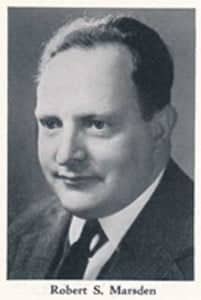Home Religion was an Important Part of Colonial Presbyterianism
With tens of thousands of Scot –Irish Presbyterians coming to Cumberland County of Pennsylvania, various Presbyterian churches were organized in the seventeen hundreds in central Pennsylvania. One such congregation was Big Spring Presbyterian Church in Newville, just west of Carlisle.
After several pastors filling the pulpit, a call was extended to the Rev. Samuel Wilson on March 21, 1787. After passing his ordination exams by the Presbytery of Donegal, Rev. Wilson was installed as pastor on June 20, 1787. It was said that his pastorate was one of activity and prosperity for the congregation. He would stay there for thirteen years until 1799.
Evidently, the gift of administration was possessed by Rev. Wilson. He composed long lists, listing the ages of all members and adherents. Dividing them into districts, Samuel Wilson assigned a ruling elder over each district. These elders, among other duties, had the ministry of visiting each family and adherent on an annual basis. These were no social times. Pastor Wilson had given to each elder, and those family members underneath their oversight, various questions of understanding, complete with catechisms to memorize from the Westminster Standards. We have two samples of questions upon which the annual visits would ask and expect answers.
In Ruling Elder John Carson’s district, the first book of the Bible was the focus. His questions were: 1. Who was the penman of Genesis? When was it written? What length of time does its history contain?; 2. What are the principal doctrines and events?; 3. What do you understand by creation, and is it a work peculiar to God only?; 4. What seems to be the order of creation and what is the work of each day?; 5. What are those called who do not acknowledge divine revelation? What objections do they offer against Moses and how are their writing confuted?; 6. What rational arguments can be offered in favor of Moses, that his mission was from God and his writings were of divine inspiration?; 7. What Scriptural prophecies have been fulfilled, and what at present is fulfilling or yet to be fulfilled? After these questions were to be discussed by each family, there was to be an examination upon the ninth chapter of the Confession of Faith! Elder Carlson had 24 families in his district.
Elder William Lindsay had seven questions given by Pastor Wilson to his flock of members. They were: 1. What are the different kinds of faith in Scripture?; 2. What are the marks of true faith?; 3. Where does saving faith lie in assent or consent?; 4. What reason would you assign why no actions are acceptable to God, but such as flow from faith?; 5. Will it then follow, that wicked and unregenerate persons may as well transgress the law, as endeavor the observance of it? 6. Must we turn from sin in order to come to Christ by faith? 7. Seeing faith is the act of a believing soul, in what sense is it said to be the gift of God? After these questions were asked and answered, Chapter 8 of the Confession of Faith was discussed.
Biblical Christianity was to be practiced not only within the four walls of the Church, but also inside the houses which made up the homes of Presbyterian families. And spiritual elders were to be the spiritual overseers of each family.
Words to Live By: Pray for the elders of your church, that they might shepherd aright the church of God, which He has purchased with His own blood. How comfortable would you be if similar type questions were asked of your family in an elder’s visitation? Do you feel that such Scriptural exams would be profitable to your family? The local church specifically? What might you do to suggest such an approach to the people of God?

